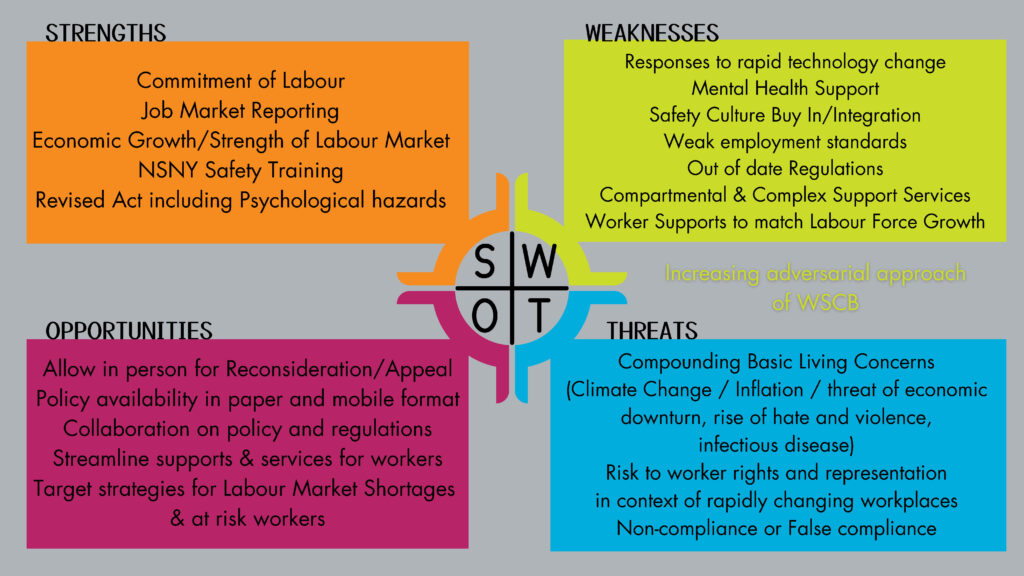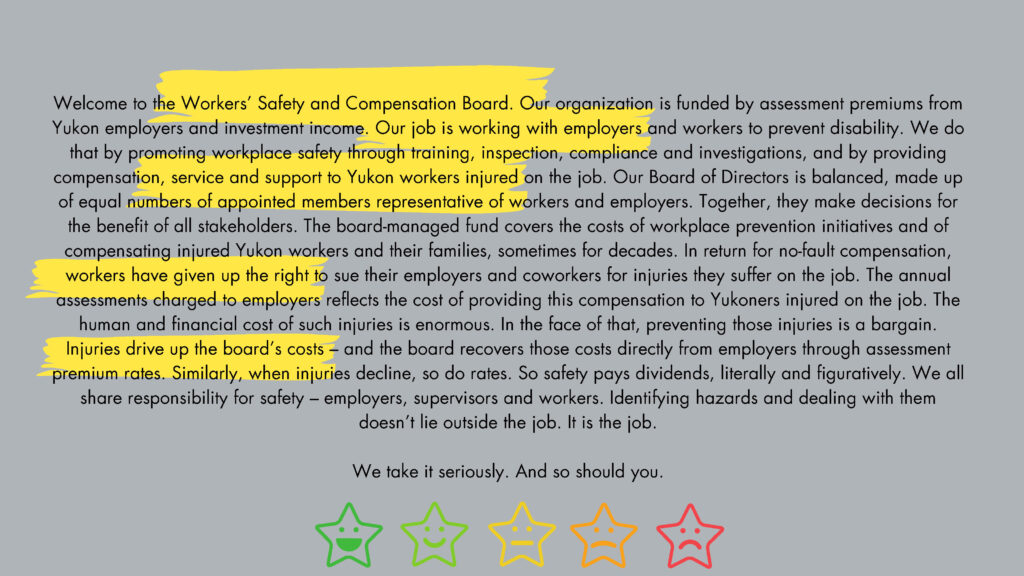
Yukon: A Safe Place for Workers?
President Teresa Acheson presented to stakeholders of the Workers Safety & Compensation Board (WSCB) and their Board of Directors on January 30th, 2024 as part of their strategic planning for the next few years. A labour scan by the Yukon Federation of Labour identified strengths, weaknesses, opportunities, and threats regarding worker safety and compensation.

Considering workplace safety, the YFL considers commitment to labour, job market reporting, economic growth, and safety training (eg. NSNY) among the strengths. We have a relatively new Workers Safety & Compensation Act that includes psychological hazards, a strong labour market, excellent statistical reporting, and a commitment of labour organizations to advocate for workers in the face of changing work environments and technological advancements.
Opportunities include collaboration on policy and regulation updates, improved distribution and access to policies, and targeting safety training for labour market shortages and at-risk workers. Some of the opportunities are easy wins that would have a significant impact on worker safety, others may take a lot of time and effort on the part of stakeholders and governments.
Primarily, a weakness is still our small population compared to other provinces, which impacts our ability to respond to rapidly changing challenges and opportunities. The workforce growth rate is moving a lot faster than our scale-up of support services; such as the ability to inspect, train, and address the skills gap left by the retiring workforce and an influx of young and immigrant workers. The scan identified weaknesses in response to rapid technology changes, lack of mental health support, and weak employment standards or lack of collaboration between government agencies.
We must still address threats to worker safety, such as non-compliance with safety regulations, paper without practice, lack of workforce, lack of awareness, intimidation to report or seek support, and the imbalance of power between workers and employers, and the agencies regulating the workplaces. Threats include compounding basic living concerns, risks to worker rights and representation in rapidly changing workplaces, and a reported increase in adversarial approaches to workers.
A Safe Place with Workers’ Safety & Compensation
WSCB has a role in applying the ACT for a culture of health & safety, including promoting safety culture, positive reinforcement for worker safety and well-being, and forward movement to provide ongoing improvements to regulations, safety practices, and adapting safety measures.
In general, workers are not experts in interpreting legislation or legal representation. Workers rely on the support of the WSCB, safety officers, and other relevant agencies when there are safety concerns or issues in the workplace, primarily because they are already in a disadvantaged position as workers and their focus is their day-to-day duties.
Take for example, a new-to-Yukon worker just navigating the WSCB website: consider they are already coming from a place where they fear losing their job or employment status for speaking up; add to that English as a second language, no formal safety training outside of an on-site orientation, and now an issue in the workplace has brought them to Workers’ Safety and Compensation Board website…
They might first read this is the “worker’s” safety and compensation board. That seems good. Then they read “our job is working with employers...” (not so good if their employer is already a danger to them). They might catch “service and support to Yukon workers injured on the job”, which would indicate they are in the right place to seek help. But then they read “workers have given up the right…” and “injuries drive up the board’s costs…the board recovers those costs directly from employers“…which now leave the workers feeling very precarious, feeling more of a burden and considers it unsafe to reach out for help or support for further fear of reprisal from an employer or the system.

Does the Worker Feel Safe?
There is already an imbalanced relationship between workers and employers who hold control over hiring and firing. The employer has more resources than employees. It used to be perceived that WSCB brought some balance and protection to this relationship. However, recent reports raise concerns:
- workers laid off or fired for bringing up safety requirements at work
- workers encouraged not to report injuries so employers can avoid increased fees
- forged paperwork to meet compliance without practice
- WSCB medical advisors offering extensive opinions to disprove a work injury
- Workers Advocate declining cases verbally and not in writing
- Mishandled cases due to lack of awareness or sensitivity to outlying Yukon community realities and indigenous reconciliation efforts.
- workers asked to prove their claim under the act before receiving support.
- Women in trades asking “Where can I work that is safe” expecting most to be unsafe.
- WSCB increasing reliance on third-party consultants and out-of-territory lawyers to argue against legitimate claims or try to direct the Tribunal.
This feedback is directly from cases referred to YFL, reports from Yukon Building Trades, Yukon Employees Union, YWSC Appeal Tribunal, and other labour organizations like YWITT. In most cases, workers are too afraid of reprisal to pursue any action against an employer, even after losing their job.

President Teresa Acheson asked the WSCB Board of Directors to consider both the perception and reality of an increasingly adversarial approach of the Board towards workers, as both can have a devasting impact. The main takeaway is the need to be aware of both what people think and what’s happening, especially when workers express feeling unsafe – a sentiment that can have big consequences for their well-being.
Fair compensation and support for workers who get hurt on the job becomes vital in reinforcing the Act’s commitment to protecting workers. Workers should feel comfortable reaching out for assistance, and they should not be expected to navigate complex legislative details on their own or present their case (while injured) against employers, plus lawyers, doctors, and consultants of WSCB.
The goal is to ensure a collaborative approach to creating and maintaining a safe working environment for all workers but also safe reporting and safe recovery when injured. After all, this is the Workers’ Safety and Compensation Act and Board.
Teresa Acheson, President Yukon Federation of Labour





